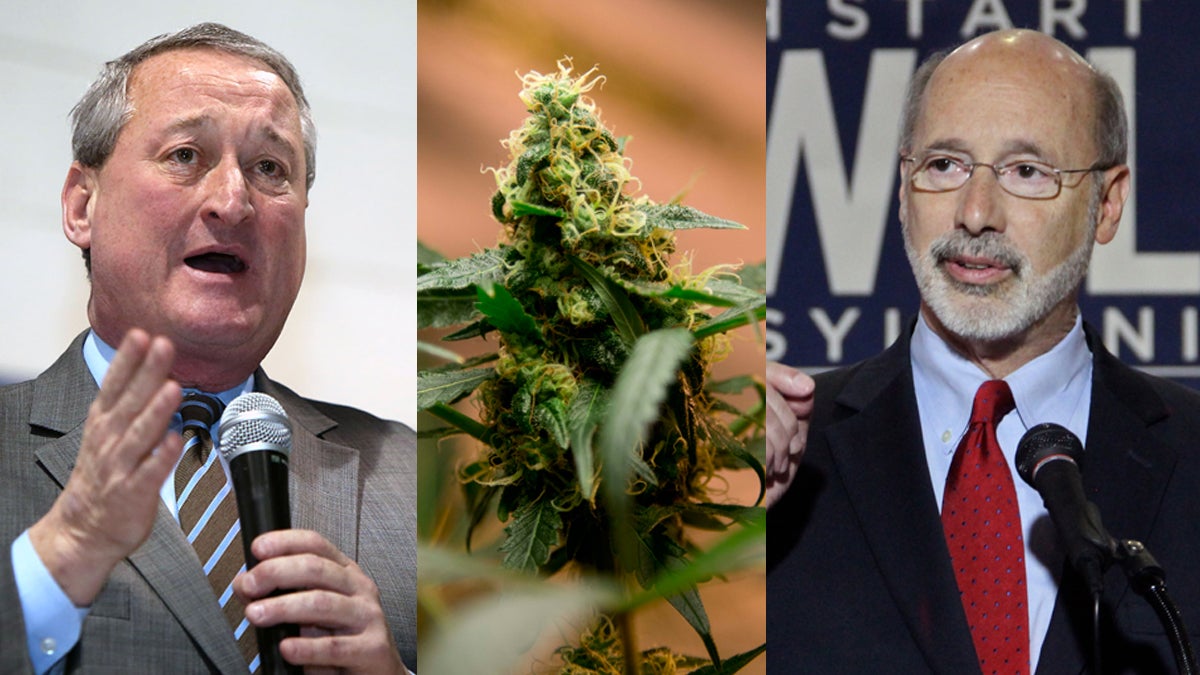Wolf taking Kenney’s cue on marijuana?

Democratic mayoral candidate Jim Kenney (left); a marijuana plant; and Pennsylvania Governor Tom Wolf (Photos by Stephanie Aaronson/The Next Mayor; Eduardo Verdugo/AP Photo; and Emma Lee/WHYY)
In the wake of Jim Kenney’s convincing win in Philadelphia’s Democratic mayoral primary, Pennsylvania Gov. Tom Wolf says he believes marijuana should be decriminalized on a state level.
Wolf has long supported legalization of medical marijuana, but his support of statewide decriminalization underscores the point made by Kenney’s victory. That point? Marijuana decriminalization is not the political football that it was previously thought to be.
Kenney, you might remember, championed marijuana decriminalization as a City Councilman. His bill, which eventually became law despite initial opposition from Mayor Michael Nutter, allowed police officers to issue what amounts to a ticket for low-amount marijuana possession.
The marijuana decriminalization law, Kenney said, should move more than 4,000 marijuana cases out of the main court system each year, while countering the unfair application of drug laws. Since African Americans are more likely than whites to be arrested for marijuana possession, despite the fact that whites are just as likely to be users, Kenney reasoned, blacks should benefit from decriminalization. In addition, the criminal records resulting from marijuana arrests would disappear, thus helping those caught with marijuana to get jobs.
Those arguments made marijuana decriminalization sound like a panacea, and created a potent political message for Kenney.
Gov. Wolf’s spokesman, Jeff Sheridan, reponding to an earlier version of this column, said that the governor’s position on decriminalization is not influenced by Kenney’s victory, but is based on thoughtful contemplation.
“While we certainly respect Jim Kenney’s view on this,” Sheridan wrote in an email, “Governor Wolf’s position is not a result of the Philadelphia mayoral primary. It is the result of his experience in business and it is a careful and thoughtful policy stance. It is not only the right thing to do, but a smart thing to do economically.”
For his part, Wolf has said that the decriminalization of recreational marijuana is a common sense approach to fixing an aspect of our criminal justice system that is patently unfair.
“We have too many people in prison, we break up too many families, we destroy too many lives and we keep too many people from getting the kinds of jobs that they want to get,” Wolf recently told Fox43 in Lancaster, Pa.
Wolf is right. Jailing people for drug use is the wrong way to go. He’s also correct when he says that criminal records keep too many people from gainful employment. That’s why I support decriminalization.
But let me be clear. As someone who has seen too many lives—including my own—negatively affected by drug use, I don’t believe decriminalization is a cure-all. Because the problem with drugs is not just the criminal records that they create. The problem is that drug use itself destroys lives.
Yes, I’m glad to see politicians address one aspect of the racial bias in our criminal justice system. But in truth, decriminalizing marijuana does little to stop the widespread bias against African Americans where law enforcement is concerned.
Racial minorities are still more likely than white Americans to be arrested. They are more likely to be convicted after an arrest, and once convicted, they are more likely to face stiff sentences, according to the Sentencing Project’s report to the United Nations on sentencing disparities.
Not only that. Unarmed blacks are still three times more likely to be shot and killed by police than whites, according to a recently released analysis by the Washington Post. And according to the investigative news agency Pro Publica, black males are still 21 times more likely to be shot by police than our white counterparts.
Decriminalizing marijuana also doesn’t change much about employment opportunities, because even if drug users are no longer arrested for marijuana possession, drug tests by employers still eliminate users from many employment opportunities.
So while decriminalization begins the process of dismantling the damage that drugs can do to people’s lives and futures, it does not cover all the ways in which actual drug use destroys people’s lives.
Therefore, I’d like to make several suggestions.
If the governor wants to stop drugs from destroying people’s lives, he should do everything he can to provide more access to treatment for those who use drugs.
If he wants people to have greater access to jobs, he should fully find our educational system.
If he wants to keep people out of jail, he should provide sentencing alternatives for those who will still get arrested for drug use.
Wolf’s budget proposals in that regard could make some of those things a reality. He’s proposed $7.5 million in new dollars for drug treatment, $1 billion in additional funding for public education and $120 million in early childhood education. The latter, according to Wolf’s spokesman Jeff Sheridan, could save the state over $300 million in prison costs annually down the road.
Those budget proposals still have to pass a Republican legislature, however, and that is not a certainty.
Moreover, no amount of money can address the underlying biases that cause African Americans and other people of color to be arrested more readily, convicted more easily, and more harshly sentenced than whites.
Yes, decriminalization is a start to addressing these issues, but it is in no way the panacea that it appears to be.
To believe otherwise is to be caught up in a smokescreen.
Editor’s Note: This version has been updated to include a quote from Gov. Wolf’s spokesman, Jeff Sheridan, and figures from the governor’s proposed budget, which has not yet passed the state legislature .
WHYY is your source for fact-based, in-depth journalism and information. As a nonprofit organization, we rely on financial support from readers like you. Please give today.


